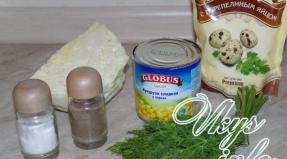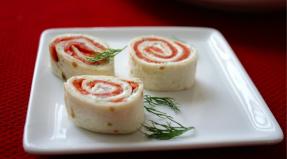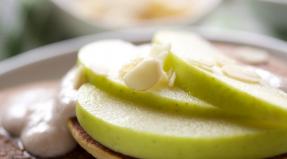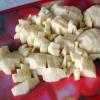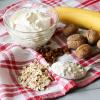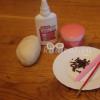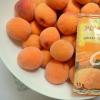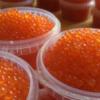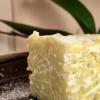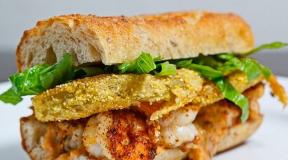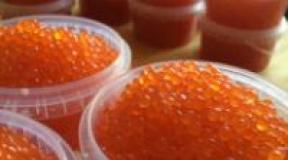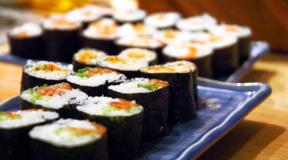Butter when heated. Sunflower oil for frying is more a minus than a plus
12:04 23.04.2014
The answer to the question: "What oil is better for frying?" sounds something like "And for what purpose are you going to do this?" Weird? If a person considers frying as the only acceptable way of cooking, regularly and with pleasure consumes fried food, he should ask in the culinary forum. They will tell you what does not stick to which pan, which gives the best taste to the dishes and other valuable gourmet information.
But doctors all over the world agree that fried food should not be in the main role in the diet, but in episodes. And the less often it appears on the table, the lower the risk of atherosclerosis, diseases of the heart, liver, gastrointestinal tract and kidneys.
What oil is better to fry a supporter of a healthy diet
This whole story of low-fat cooking sprays and white ceramic skillet covers has nothing to do with the harm of fats. In fact, dietary lipids are extremely beneficial for:
The health of the nervous system, including the central nervous system;
Reproductive health. The point is not in the statement "fat is a hormonal organ", but in the fact that with a low-fat diet, the secretion of sex hormones decreases, which, for obvious reasons, does not improve the quality of human life;
Health of the heart and blood vessels. Useful omega-three fatty acids - a recognized product for the prevention of atherosclerosis and the normalization of the level of "bad" cholesterol;
Such an elusive and individual factor as "the pleasure of the diet." Whatever the low-fat propagandists say, food tastes better when it's in butter.
But only when heated, that is, during the frying process, the properties of the oils change. And fried olive or sunflower oil is no longer such a wonderful product for a healthy lifestyle and weight loss. Radical supporters of "clean" food do not fry food from the word "at all". They use the grill, steamer, simmer vegetables in water and add high quality cold oil to the finished dish.

In general, the rule is simple - the more unsaturated fatty acids in the oil, the more chances it has not to survive heat treatment. Don't believe me? Try to heat a little flaxseed oil (almost the richest source of unsaturated fatty acids) in a frying pan, and when you see black smoke, you will know what this is about.
Periodically, publications appear proving that unsaturated oils, when heated, from useful ones turn into extremely harmful ones, in some works even the carcinogenic effect of such oils is proved.
What Western ZOZhevtsy fry on
Do you know why coconut oil has such a good reputation and is sold so well on all kinds of health food sites? Not at all because of the taste of the Bounty, or rather, not at all because of him. Among vegetable oils, this product contains the highest amount of saturated fat (about 91%), and is least destroyed during cooking.
True, frying on coconut requires manual dexterity and a very good pan / pancake maker. Use cookware with a fairly thick bottom and reduce the heat so that the oil does not start smoking. The challenge is to quickly flip what you fry. Constantly and quickly until it cooks. And do not heat the oil until smoke appears. By the way, lazy Americans have come up with an electric pancake maker with a set temperature, in which even pancakes made of protein powder are fried normally.
"Number two" among saturated fats is ghee or ghee, or nothing more than good old ghee, which you picked out of porridge carefully prepared by your grandmother as a child. Due to its "already melted" origin, ghee hardly burns at normal heating temperatures, and is suitable for preparing almost all vegetable dishes.
Number three is olive oil. It is rich in olein, and does not degrade as much when heated as regular sunflower.
Well, reflections about the fact that refined oil is more useful for frying than “oil with a smell” are more likely to be referred to the heading “mistress of note”, and not to the achievements of dietetics. Even if the oil does not smell at all during the cooking process, this, unfortunately, does not mean in the least that it will be extremely beneficial to your health.
What oil is better to fry and how to do it
There should be the words "if really necessary." Fried food is harmful a priori. More or less "nothing" only dishes like stir-fry, where micro-pieces of meat and vegetables come into contact with oil for a split second.

Here are some simple tricks to make fried food healthier:
Lubricate a skillet with olive oil using a cotton swab and quickly sauté your vegetables. If they are vegetables, 30 seconds on each side is enough for the taste to become “fried”. Then put them in a baking dish and cook in the oven until cooked. By the way, non-aesthetes can try to immediately spread the notorious potatoes into slices on parchment and bake at 200 degrees. Well, sprinkle with oil from a spray bottle, about 2 minutes before turning off the oven;
If “it” is poultry or fish, use the same method, but bring the dish to readiness by turning on the grill or convector. Manipulations allow you to "kill two birds with one stone" - you will not heat food in oil for too long, which will reduce the risk of its destruction, and you will reduce the calorie content of the finished dish, since the oil will not be actively absorbed into the "cooking".
Manipulations allow you to "kill two birds with one stone" - you will not heat food in oil for too long, which will reduce the risk of its destruction, and you will reduce the calorie content of the finished dish, since the oil will not be actively absorbed into the "cooking".
In general, fried food does not in any way fit into a healthy diet, and like other "exception dishes" should occupy an honorable "top" place in the pyramid of your food, along with candy cookies. Conventionally, you can eat 2-3 free meals a week, regardless of the goals that you set for yourself (lose weight, maintain health, improve health, etc.). These two or three servings, by the way, include sweets and fried "on a par". So what specific choice you make is entirely up to you. The only thing nutritionists still advise is to refrain from cookies like "brushwood" and other sweet and fried foods at the same time. It has been proven that such a combination of macronutrients, as in them, causes overeating in almost any person.
Fitness trainer Elena Selivanova
Image copyright Thinkstosk
Choosing a cooking oil is not easy, writes Michael Moseley.
When it comes to fats and oils, we are spoiled for offer. Supermarket shelves are full of all sorts of options. But lately, the choice has been confusing due to the huge amount of discussion about the benefits and harms of consuming different types of fats.
In the program Trust Me, I "m a Doctor", we decided to look from the other side, asking the question: "What fats and oils are best for cooking?"
To figure it out, we offered Leicester residents different types of fats and oils and asked our volunteers to use them in their daily food preparation. We also asked the volunteers to save the leftover oils for later analysis.
The participants in the experiment used sunflower oil, vegetable oil, corn oil, cold-pressed rapeseed oil, olive oil (refined and virgin olive oil), butter, and goose fat.
Samples of oils and fats after use were collected and sent to the School of Pharmacy at the University de Montfort in Leicester. There, Professor Martin Grootveld and his colleagues conducted a parallel experiment in which they heated these same oils and fats to frying temperatures.
When you fry or bake at high temperatures (around 180 degrees Celsius), the molecular structures of the fats and oils you use change. They go through oxidation - they interact with oxygen in the air and form aldehydes and lipid peroxides. At room temperature, something similar happens, only more slowly. When lipids go rancid, they are oxidized.
Consuming or inhaling aldehydes, even in small amounts, has been associated with an increased risk of heart disease and cancer. So what did Professor Grootveld's group find out?
“We found,” he says, “that oils rich in polyunsaturated fats — corn oil and sunflower oil — produced very high levels of aldehydes.”
I was very surprised, as I have always considered sunflower oil to be healthy.
Image copyright BBC World Service Image caption Lard has a reputation for being harmful"Sunflower and corn oils can only be used," says Professor Grootveld, "if you don't heat them like frying or cooking. It's a simple chemical fact that something we think is good for us turns into something not at all useful at standard frying temperatures. "
Olive oil and cold-pressed rapeseed oil produced much less aldehydes, as did butter and goose fat. The reason is that these oils are rich in monounsaturated and saturated fatty acids, and they remain more stable when heated. In fact, saturated fatty acids hardly go through an oxidative reaction at all.
Professor Grootveld mainly advises using olive oil for frying and other thermal processing: "Firstly, because fewer of these poisonous molecules are produced, and secondly, the molecules produced are actually less harmful to the human body."
His research also suggests that when it comes to cooking, frying with fatty acid-saturated animal fats or butter may be preferable to sunflower or corn oil.
"If I had a choice," he says, "between lard and polyunsaturated fat, I would use lard all the time."
Our research came as another surprise, as Prof Grootveld's team found in several samples sent by our volunteers, a couple of new aldehydes that had not previously been observed in experiments with heating oils.
"We have discovered something new for science," he says with a smile on his face. "This is the first time in the world, I am very, very, happy about it."
I'm not sure our volunteers would have been equally enthusiastic about the development of new, potentially toxic molecules as a result of their concoctions.
So what's the general advice of Professor Grootveld?
Above all, try to fry less, especially at high temperatures. When frying, minimize the amount of oil used, and also try to remove oil residues from the fried food, using a paper towel.
To reduce aldehyde production, use oil or fats that are rich in monounsaturated or saturated lipids (preferably more than 60% of one or the other, and more than 80% combined) and low in polyunsaturated fats (less than 20%).
Grootveld says the ideal "compromise" oil for cooking is olive oil, "as it contains about 76% monounsaturated fat, 14% saturated and only 10% polyunsaturated - monounsaturated and saturated fats are more resistant to oxidation than polyunsaturated fats."
When it comes to cooking, it really doesn't matter if the olive oil is first pressed. “The antioxidant levels in extra virgin foods are not enough to protect us from heat-induced oxidation,” he says.
His final advice is to always store vegetable oils in a closet, protected from light, and try to avoid reuse, as this also leads to the build-up of harmful by-products.
What you need to know about fats
Image copyright BBC World Service- Polyunsaturated fats Contain two or more carbon-carbon double bonds. When consumed in foods such as nuts, seeds, fish, and leafy greens, they are beneficial for your health. However, the benefits of consuming sunflower or corn oils, while rich in polyunsaturated fats, are much less obvious.
- Monounsaturated fat They contain only one carbon-carbon double bond. They are found in avocados, olives, olive oil, almonds and hazelnuts, as well as lard and goose fat. With 76% monounsaturated fat, olive oil is a major component of the Mediterranean diet, which has been shown to significantly reduce the risk of heart disease
- Saturated fat They do not contain double bonds between carbon molecules. While we are encouraged to cut out saturated fat, especially dairy and other animal fats, the benefits are still disputed.
The debate about what to use to properly cook food has been going on for several decades.
What oil is better for frying? Scientific information is constantly changing, and besides, sometimes some food concern aggressively enters into the discussion with advertising its product and turns the perception of part of the public upside down.
For consumers, in fact, only the opinion of specialists is important, although it should be taken with a certain restraint.
Scientists' opinion on the best cooking oil
When concluding how useful a particular fat is for frying, scientists do not take into account the issue of taste. The fact is that at high temperatures, changes occur in the structure of the oil and various substances harmful to health can arise. And that is what is being discussed in various analyzes. In general, it is indicated that fats that contain monounsaturated fatty acids are best suited for frying. Those dominated by polyunsaturated ones are better for cold dishes.
Salo
Both pork and goose are suitable, although the latter usually has a higher water content. Therefore, more of it is required for cooking. Lard can be excellent for cooking, it copes well with high temperatures, but has a high content of saturated acids. And pork is still full of cholesterol. People who lead a healthy lifestyle need to control their use.
Palm oil
Very suitable for frying, but, unfortunately, like lard, it has a high content of saturated acids.
Coconut oil
A similar case, as with lard and palm. Great for preparing various dishes, but be careful with calories and cholesterol!
Rapeseed oil
Refined is often cited as one of the best frying oils in terms of saturated acid content. It has another advantage, after frying it is well absorbed into napkins, and thanks to this, dishes are obtained to some extent healthier.
Sunflower oil
In its refined form, it also belongs to quality frying oils. Unrefined is suitable only for short heat treatment and stewing. Of course, if you like a specific flavor.
Rice oil
It is very good to cook on it, but, unfortunately, the high price is an obstacle. It overcooks very slowly at high temperatures and has a high content of natural antioxidants.
Corn oil
A versatile product. It can be fried, stewed and used for deep frying. Does not produce any harmful compounds. It is consumed sparingly, does not smoke and does not burn.
Olive oil
Natural (virgin) ideal for salads and very quick cooking of vegetables, pasta, sautéing onions until transparent, etc. Can I fry in olive oil? The usual way is not worth it.
If you want to cook any breaded food, when you need to keep the oil at a high temperature for a long time, it is better to choose refined oil, which is not at all suitable for a cold kitchen.
Butter
It can be used for short-term frying (for example, for scrambled eggs, toast or toasting vegetables for soup), but with prolonged heating, dangerous substances appear in it, so it is very unsuitable for this.
But if you overheat it, it changes its qualities and withstands a higher heating point.
Examples of unsuitable oils that you shouldn't fry with at all:
- from grape seeds,
- sesame,
- linseed.
- soft margarine.
With hydrogenated fats, things are a little more complicated. Some are of very high quality, others are quite the opposite, especially those that are cheaper, so it is advisable to avoid them when frying.
Thus, it turns out that there should be at least two bottles of oil on the shelf - one for frying, and the other for cold dishes. Well, before succumbing to the calls of another advertisement for the miracle of oil, remember your everyday experience. Why trade good for dubious best?
Refined or unrefined? What oil to fry in? What oil does not release a carcinogen when frying?
- On coconut
- on creamy
emit -margarines
and pans with teflon - It is better to fry on refined and natural salad
- For cooking in Russia, mainly sunflower or olive oil is used.
You need to fry in oil with the highest boiling point.Boiling points for sunflower - 120-140, olive 160, corn, soy 180.
Olive oil can be used for low heat cooking.Compare the decomposition temperature of oils when boiling:
Avocado270
Peanut 160
Grape seed205
Walnut 160
Coconut177
Hemp160
Red palm230
Sesame177
Linseed107
Macadamia199
Almond215
Extra virgin olive 190
Sunflower107
Rapeseed255
Rice255
Safflower107Do not heat the oil too much so that it starts to smoke. This is the temperature at which fatty acids break down rapidly. Of course, for some recipes, it's important to keep the cooking temperature high. In this case, try to select an oil that is more resistant to high temperatures and contains fewer unsaturated fatty acids.
Change oils often and remember to use the expiration date, which quickly decreases from the moment you open the bottle. Store opened butter only in the refrigerator.
- Healthier with ghee. It is the least harmful for frying.
- At the request of Habitat, a professional chef fried potatoes in different oils: refined sunflower, unrefined, sesame, olive, melted, butter. All samples and the remaining oil were taken to the Nutrition Institute. Here is almost the only laboratory in Russia where you can check whether a product contains a strong carcinogen, acrylamide. Even experts were surprised by the results. In most samples, the acrylamide content is at about the same level in the range from 900 to 1500 micrograms per kilogram, within the normal range. And in two of the seven samples, the presence of acrylamide was found to be completely negligible. Oddly enough, these potatoes were fried in the most common sunflower oil. Potatoes fried in unrefined oil have 0.584 milligrams per kilogram. And in the one that was fried on refined 0.009 milligrams.
Thus, experimentally, the program "Habitat" proved that it is better to fry potatoes in the most common sunflower oil. Link http://www.1tv.ru/sfilms_edition/si6222/fi117 - on corn
- anyone exudes so eat raw
- And this is where the microwave can help you. Everything is prepared very conveniently and quickly. And most importantly, it allows you to fry even without oil at all. For example, I fry cabbage without oil and with the lid open, and at the very end, just for taste I add a little olive + butter. Likewise with fish. And, for example, mushrooms for meat hodgepodge or for pizza, I fry without oil at all. The seeds are generally without oil, of course, washed (often I take generally cleaned ones) and on microwaves with the lid open.
- Refined.
There is a difference when frying food. Cooking with refined oil does not generate the burning, foam, and smoke smells that often occur with unprocessed oil. Sometimes refined oil also smokes, but this happens at very high temperatures, which are generally not advised to use for cooking. When unrefined oil burns and smokes in nm, harmful substances carcinogens are formed. - unrefined is more aromatic, tastier with it
- refined
- if you choose from sunflower, then refined. ... because unrefined has a specific smell (which is good only in fresh salads, but not in any way when frying), and it foams strongly ...
and it is best, of course, to use olive oil pure 100% olive oil (refined natural olive oil specially for frying) - not to be confused with extra virgin!
Hello dear readers!
Who among us does not care about our health? And it's no secret that proper nutrition is the key to good health. To do this, you need to limit the number of fried foods on the table, more often introduce fruits and vegetables into the diet.
But sometimes you really want crispy potatoes or a piece of delicious chop! So that another hearty lunch does not turn into a direct road to atherosclerosis, you and I need to know in what oil you can fry without harm to health.
Many of you, dear readers, are aware of the terrible words "cholesterol" and "carcinogens" with which nutritionists scare us. And most of all these harmful substances are in the heat-treated vegetable oil.
If you consume a lot of fried food, the accumulated cholesterol will contribute to the formation of plaque in the vessels. As a result, heart attacks, strokes, atherosclerosis and other diseases that our century suffers from.
Why do vegetable fats become dangerous after heating? Each oil has a smoke point when the active breakdown of fats begins. As a result, three new components are formed:
- ketones;
- peroxides;
- aldehydes.
They are very harmful to health and can even cause cancer. The more heat-resistant the product is, the higher the smoke point. In turn, the stability depends on the amount of saturated acids.
Most of them are found in animal fats (melted, creamy), but it is much more difficult to decide on vegetable fats.
When buying oil, dear readers, you have often wondered what kind of oil to buy: refined or unrefined. What is the difference between them?
Refined is much more suitable for frying. During the purification process, excess water is removed from it, and the fuming temperature rises. The unrefined product is best consumed raw, adding to salads or pouring over ready-made meals.
There is another important indicator that determines whether vegetable fat changes its properties when heated to 110 degrees. It is called the oxidative stability index.

The highest value for palm oil is up to 30 hours. But the decay of sunflower begins after 3-4 hours. Of course, we don’t fry food for 3 hours. This indicator only indicates that it is better not to reuse sunflower fats.
Today, you can find a large number of different types of oils on store shelves:
- olive;
- linseed;
- pumpkin;
- nutty;
- mustard and others.
You and I have to choose what to fry on without harm to health. In order not to sort out all the products on the supermarket shelves, we will focus on the five most affordable varieties.
Getting started with the choice of oil for frying

Now we will find out in what kind of oil it is better to fry without harming our body. Nutritionists advise to eat only those foods that grow in your area. This rule also applies to oils. Therefore, let's start with the most "native" - sunflower.
Sunflower oil for frying is more a minus than a plus
The very combination of the words "vegetable oil" among the inhabitants of Eastern Europe is associated precisely with the product obtained from sunflower seeds. It contains a lot of unsaturated acids and is very useful when fresh.
However, during heat treatment, sunflower fats quickly pass into the stage of the formation of carcinogens. If you still like to fry, try to keep this process to a minimum and in no case bring the liquid to smoke.
If you have chosen sunflower oil for frying, then never reuse it.
Flaxseed oil for frying - becomes poison
Many have heard about the benefits of this oil. It often appears in traditional medicine recipes, doctors and nutritionists recommend it to pregnant and lactating women. However, you can only get the most out of fresh produce.

The flax seed drug does not tolerate even the slightest overheating. It must be stored in a dark, dry place: when exposed to sunlight, fats lose their properties. What can I say about frying?
When heat treated, linseed oil becomes rancid and turns into a real poison due to the large amount of unsaturated acids. Better add it raw to salads.
Olive oil is the best choice for frying
There is a widespread belief that it is better to fry in olive oil than in sunflower: less carcinogens are formed in the former. This is partly true. Although olive oil contains 75% unsaturated fat, its smoke point is quite high: 240 degrees.

This oil does not smoke, and the products prepared with it are amazingly tasty. So there is no better way to cook meat or fish.
Mustard oil - ideal for frying, but not very tasty
It became known in Russia since the 18th century, and in England it was served to the table of kings as a delicacy. Today, this product is rarely found in cooking. The reason is the strong smell and unusual taste. At the same time, it does not burn, does not smoke and is excellent for frying.
It is the most dietary vegetable fat, valuable due to the linoleic and linolenic acids in its composition. The oil obtained from mustard is recommended for people with diseases of the cardiovascular system, atherosclerosis.
Palm oil for frying - I would not use
It is very rare to find this product in its pure form in our stores. But it is included in many low-quality products and is considered very harmful. At the same time, frying in palm fat is healthier than in sunflower oil.
Most of it is saturated fat, and the smoke point is 230 degrees. The only problem that exists with this product is its mass industrial production and low quality, so it is very difficult to trace its effect on health.

If you nevertheless decide to fry in vegetable oil, it is better to choose olive from all the products available in our latitudes. Just choose a refined product specifically designed for this purpose. This way you will preserve your health and longevity.
You were with Ekaterina Chesnakova with garlic, fried potatoes and salad.
P.S. I'm on a diet, I really want to eat
Read also ...
- Chicken liver pate
- Delicious zucchini with cheese in sour cream in the oven - a step by step recipe with video Zucchini recipes in the oven with sour cream
- Banana rice and corn flour pancakes (gluten free) with homemade banana sauce Banana pancakes with semolina
- Cabbage casserole with chicken Chicken fillet casserole with cabbage
